高中英语高考动词分类汇总(共四大类)
高考英语动词归类复习
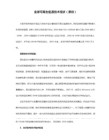
It appears that…
④状态类: keep, stay, remain;
注be, become, turn, remain, make可带名词
He remains a teacher.=He is still a teacher
3.You don’t think
1) believe, think, suppose, expect, guess
I think so. I think not = I don’t think so
let sb do sth
have sb \ sth do
have sb \ sth doing
have sb \ sth done
三、主动表被动类(主语的特点、性质、状态)
sell, wash, burn, cook, cut, drive, dress, play, last, open, write, start, run, read, act, draw, clean, wear, lock; sell,weigh,measure .+adv. (well, poorly, easily, smoothly, badly)
2) hope, fear, be afraid + so / not
3) intend, want, plan, wish, like, love, hate, hope, try, would (should) like / love to
1.Do you want to have a rest? Yes, I want to, but I can’t.
二、使役、感官动词类
高考英语动词归类复习总结

高考英语动词归类复习一、连系动词二、使役、感观动词三、主动表被动四、只接动名词做宾语的词、词组五、只接不定式作宾语的词、词组六、宾语不同、意义不同七、接动名词、不定式意义区别不大八、宾语不同、语态不同、但意义相同九、接宾语和宾补、形式不同十、接虚拟语气的词十一、瞬间非延续性动词十二、表计划未能实现的动词十三、情感动词类十四、否定前移类十五、不带不定式作复合宾语十六、省略替代类一、连系动词类①变化类:become, get, turn, grow, make, come, go, fall ,go bad / hungry / mad / wrong,fall (fell-fallen) ill / asleep※feel (felt-felt) sick / sleepy②感观类:look, sound, feel, taste, smellHis voice sounds ________.A. wellB. beautifullyC. excellentD. wonderfully③显得类:seem, appear, look It looks as if…It seems as if / that…It appears that…④状态类:keep, stay, remain, lie, sit, stand ★prove, turn out The weather will _____ hot for another two weeks.A. lastB. remainC. getD. turnThe hot weather will ____another two days.A. lastB. remainC. getD. turnThe weather turned out (to be)fine. He proved (to be) honest / an honest person.注:be, become, turn, remain 可带名词He remains a teacher.=He is still a teacher.He became _____ teacher. A. a B. the C. an D. / He turned _______ teacher. A. a B. the C. an D. / 二、使役、感观动词类:let, make, have,see, look at, watch, notice, observe, hear listen to, feelThe boss made them _____12 hours a day.A. workB. to workC. workedD. workingThey were made_______12 hours a day.A. workB. to workC. workedD. workingThe boy was last seen _______football on the playground.A. playB. playingC. to playD. playedHe often heard this song _______by the famous singer.A. singB. singingC. to singD. sungHe had his leg_______.A. breakB. breakingC. to breakD. broken三、主动表被动类:( well, poorly, easily)sell, wash, burn, cook, cut, drive, dress, play, last, open, write, start, translate, run, read, operate, break, measure, weighDry wood burns easily. The cloth washes well. This phrase does not translate well into Chinese.The man always dresses well / poorly. Your composition reads well except for a few spelling mistakes.----Have you got a ticket for the concert? ----No, the tickets____well and they _____out last week.A. sell; were soldB. sell; soldC. sell; have been sold D .are sell; soldDon’t get that ink on your white shirt, for it___.A. won’t wash outB. doesn’t wash awayC. isn’t washing outD. hasn’t washed awayThey tried to get the car ____, but it won’t____.A. started; startB. to start; startC. started; startedD. to start; to start四、只接动名词做宾语的词/词组mind, risk, avoid, enjoy, miss, keep, suggest, appreciate, practise, delay, finish, dislike, excuse, imagine, consider, forbid, escape,admit, advise, allow, put off, give up, be worth, be busy,get down to, devote…to, look forward to, be used to, lead to, succeed in, spend/waste time (in),have a good/hard time (in) , have difficulty /trouble (in) ,there is no use(in)She looked forward every spring to___ the flower-lined garden.A. visitB. paying a visitC. walk inD. walking inI would appreciate ______back this afternoon.A. you to callB. you callC. your callingD. you’re callingThe day he has looked forward to______ at last.A. comingB. cameC. comeD. comes五、只接不定式作宾语的词/词组decide, expect, hope, wish, order, refuse, promise, pretend, agree, seem, attempt, fail, offer, happen, warn, afford,make up one’s mind to, be determined to,used to, be about to, be able to, have to , would like/ love to=should like/love toI would love ______to the party last night but I had to work extra hours to finish a report.A. to goB. to have goneC. goingD. having goneMr Smith warned her son ______after drinking.A. never to driveB. to never driveC. never drivingD. never drive She pretended _______me when I passed by.A. not to seeB. not seeingC. to not seeD. having not seen六、宾语不同、意义不同n 1) go on to do / go on doingn 2) stop to do / stop doingn 3) remember to do / remember doingn 4) forget to do / forget doingn 5) mean to do / mean doingn 6) regret to do / regret doingn 7) try to do / try doingn 8) can’t help (to) do / can’t help doingn ★can’t help but do=can’t but do =have to doI can’t help but tell him the truth.---I usually go there by train. ---Why not ______by boat for a change?A. to try goingB. trying to goC. to try and goD. try going---The light in the office is still on. ---Oh, I forgot___.A. turning it offB. turn it offC. to turn it offD. having turned it off He didn’t remember ______him before.A. having metB. have metC. to meetD. to having metGo on ______the other exercise after you have finished this one. A. to do B. doing C. to be doing D .to be done---You were brave enough to raise objections at the meeting.---Well, now I regret _______that.A. to doB. to be doingC. to have doneD. having done七、接动名词、不定式意义区别不大begin , start, continue, like, love, hate,prefer,It began raining. It is beginning to rain.I prefer staying home to going out. I prefer to stay home rather than go out.Tired as he was, he continued to work. =Though he was very tired, he continued working.He likes playing football, but he doesn’t like to play football today.八、宾语不同、语态不同、但意义相同need, require, want, deserve The room requires to be cleaned. =The room requires cleaning. This sentence needs_________.A. an improvementB. improveC. improvingD. improvedThe baby needs________.A. looked afterB. looking afterC. look afterD. to look after九、接宾语和宾补、形式不同allow, permit, forbid, advise, admit considerWe forbid smoking here. We forbid anybody to smoke here. You are forbidden to smoke here.We are considering _______ to the south.A. goB. to goC. goingD. goneCharles Babbage is generally considered ___the first computer.A.to have inventedB.inventingC.to inventD.having invented十、接虚拟语气的词1)insist 2)order, command 3)advise, suggest, propose , recommend 4)demand, ask, require, requestHe ordered that we (should)leave at once. His order that we (should) leave at once was right.The order was that we (should) leave at once. That we (should) leave at once was his order.He insisted that his brother_____ there.A. goB. wentC. goingD. to goHe insisted that he____ nothing wrong and ____ set free.A. do; beB. had done; wasC. had done; beD. did; wasHis voice suggested that he ______angry.A. isB. beC. wasD. wereHe suggested that the boy _____ sent to hospital at once.A. wasB. beC. isD. were十一、瞬间非延续性动词go, come, leave, start, return, arrive, stop, finish, borrow, lend, open, close, die, become, break, join, kill, marry, graduate, buy,marry--be married seat--be seated hide--behidden engage--be engaged die--be dead begin--beon join--be in borrow--keep come--be/stay leave--be away buy--have=have gotHe died ten years ago, that’s to say, he has __ for ten years.A. been diedB. been deadC. diedD. been dyingWhen Jack arrived he learned Mary ___for almost an hour.A. had goneB. had set off C .had left D. had been awayHe is leaving for Beijing tomorrow. The boy is so sick that he is dying fast. The bus is coming.The train is leaving. I am going.十二、表计划未能实现的动词intend, mean ,hope, plan, expect, think, want, suppose, promiseI had hoped to come here, but I had an unexpected visitor.=I hoped to have come here,…….★Would /should +love / like to have doneHe wants to meet you at the airport. He wanted to have met you at the airport, but he didn’t get there in time.We planned to have done good deeds for the poor people last month. I should (would) like (love) to give her the gift.I should(would) like (love) to have given her the gift. He would like to have played the violin at the concert.十三、情感动词类n 表示人的内在感受的动词encourage, excite, inspire, interest, amaze, satisfy, delight, please, move, frighten, surprise, astonish, shock, disappoint, discourage, puzzle, worry, tire, touch, relaxThe news sounds _____________.(encourage)The play was so ___________ that nearly everybody was _________ to tears.(move)Looking at her paper, she nodded with a___________ smile on her face.(satisfy)He looked at me with a __________ look. (puzzle)十四、否定前移类believe, imagine, suppose, think, feel , guessI don’t think he can finish the work,____?A. can’t heB. can heC. do ID. don’t IWe don’t believe she knows it,______?A. does sheB. doesn’t sheC. do weD. don’t weYou don’t think he can finish it, ______?A. do youB. don’t youC. can heD. can’t he十五、不带不定式作复合宾语hope, agree, suggest, demand, imagine, would ratherI wish him to come.=I hope that he will come.I allowed/permitted him to go there.=I agreed that he can go there. He advised me to do it right now.=He suggested (to me) that I (should) do it right now.I prefer him to go there.=I would rather he went there.I can’t imagine such a girl like Mary doing such a thing.He wanted me to do it.=He demanded that I (should)do it.十六、省略替代类1)believe, think, suppose, expect, guessI think so. I think not = I don’t think so2) hope, fear, be afraid + so / not3) intend, want, plan, wish, like, love, hate, hope, try, would (should) like / love toDo you want to have a rest? Yes, I want to, but I can’t.Did you get the new stamps? No,I tried to, but there wasn’t any left in that post office.I didn’t mean to call you at late night,but I had to as I did have something important to tell you.。
2025届高考英语语法复习-动词的分类知识讲解 讲义

高考英语语法复习动词的分类知识讲解cry 哭泣disappear 消失go 走,趋于live 生存,居住rise 上升,增强shiver 颤抖,哆嗦sparkle 闪耀appear 出现decay 衰退exist 存在happen 发生occur 发生,出现roar 咆哮,喧闹sigh 叹息swim 游泳arise 出现,产生deteriorate 恶化fall 落下hesitate 犹豫scream 尖叫sit 坐,位于travel 旅行collapse 倒塌die 死亡flow 流动laugh 笑quiver 颤抖smile 微笑sneeze 打喷嚏lie 躺,位于,说谎age (使)成熟,变老break 打破(记录)close 关闭,结束decrease 减少,减小end 结束,终止grow 种植,生长meet 满足,对付;相遇shake 动摇,发抖spread 散布,铺开,传播stop 断绝,停止widen 加宽,变宽begin (使)开始burn 烧毁,燃烧continue (使)继续double (使)加倍finish 完成,终结improve 改善,加强open 打开,开始show 演示,说明;显示stand 忍受,抵抗;站立tear 撕毁,流泪stretch (使)伸展;使用,消耗boil (使)蒸发,沸腾change (使)改变cook 烹饪,做菜dry 弄干,变干fly 使飘扬,飞行increase 增加run 经营,运转slow 放慢,阻碍,变慢start 启动,出发turn 使旋转,转动。
高考高频动词及动词短语

高考高频动词及动词短语A2014-2-23一、动词的分类: 根据意义和句法作用,英语动词可分为四类:1.行为动词(实义动词)①及物动词:study, develop;②不及物动词:work, swim, go, come③状态动词:(相对静止)contain, exist, own, prefer, belong④动作动词:延续性(work, stay);非延续性(marry, go, come)2.系动词①表示人或事物的特征和状态:be, feel, look, seem, taste, appear, sound②表示状态的变化:turn, go, become, get, fall, grow③表示某种状态的延续或持续:remain, keep, stay3.助动词(与动词原形或分词构成复合谓语):be,do,have,will,would,shall4.情态动词:can(could),may(might),must, shall(should)二、动词及动词短语(一)、动词词义辨析动词是是各类考试的重点,高考试题中,单项填空、完形填空和改错等三项题型中,动词辨义的比重较大,并逐年增加。
动词辨义主要指:1、形状相似的动词之间辨义。
如:lie, lay; hanged, hung; rise, raise; sit, seat等。
2、意义相近的动词之间辨义。
如:borrow, lend; speak, say, talk; hope, wish等。
3、动词与其它词形相近、意义相似的词的辨义。
如:advise, advice; cost, worth; pass, past 等。
4、意义不同,但容易混淆的动词的辨义。
如:explain, say; discover, invent, uncover; find, find out 等。
5、某些常用动词的习惯用法的辨义。
如:ask, give, call, make, find, get, keep, want, see, hear等。
高中英语动词分类精华讲解

动词的分类动词种类实义动词连系动词助动词情态动词(重点)及物动词不及物动词状态系动词持续系动词表像系动词感官系动词变化系动词终止系动词Be DoShall WillhaveCan MayMust Have toShall WillNeed dare动词形式动词原形过去式过去分词现在分词一般时过去时完成时、被动语态进行时、动词词一、动词的分类按照动词在句中的作用,英语动词可分为四类;实义动词,连系动词,助动词和情态动词。
1、实义动词(行为动词)实义动词(行为动词)说明动作或状态,能独立作谓语,可分为及物动词和不及物动词。
(1)及物动词及物动词必须接宾语,才能有完整的意思,这可以有三种情况;①动词+宾语Her father enjoys warm tea very much in summer.她的父亲夏天非常爱喝热茶。
②动词+间接宾语+直接宾语(直接宾语是谓语动词的承受者,间接宾语表示谓语动作的方向(对谁做)或动作的目标(为谁做),间接宾语紧接在谓语动词后,但它不能单独存在。
)Did he give you a present yesterday?May I ask you a question?③动词+宾语+宾补They call her "Little Li".他们叫她小李。
They elected Bush president.他们选布什当总统(2)不及物动词不及物动词本身有完整的意思其后不需要跟宾语。
例如:His mother works in a hospital.(介词短语做地点)She stayed at home yesterday.(介短)A. 记住下面这些可带双宾语的动词buy, bring, build, cook, cut, draw, find, hand, get, leave, lend,make, offer pay, pass, read,return, show, sell, tell, teach, write等。
高中英语必会语法:动词的分类,一篇全覆盖!
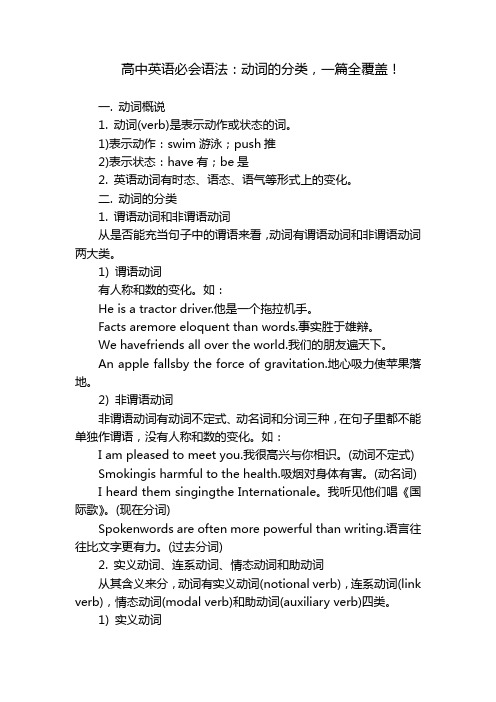
高中英语必会语法:动词的分类,一篇全覆盖!一. 动词概说1. 动词(verb)是表示动作或状态的词。
1)表示动作:swim游泳;push推2)表示状态:have有;be是2. 英语动词有时态、语态、语气等形式上的变化。
二. 动词的分类1. 谓语动词和非谓语动词从是否能充当句子中的谓语来看,动词有谓语动词和非谓语动词两大类。
1) 谓语动词有人称和数的变化。
如:He is a tractor driver.他是一个拖拉机手。
Facts aremore eloquent than words.事实胜于雄辩。
We havefriends all over the world.我们的朋友遍天下。
An apple fallsby the force of gravitation.地心吸力使苹果落地。
2) 非谓语动词非谓语动词有动词不定式、动名词和分词三种,在句子里都不能单独作谓语,没有人称和数的变化。
如:I am pleased to meet you.我很高兴与你相识。
(动词不定式)Smokingis harmful to the health.吸烟对身体有害。
(动名词)I heard them singingthe Internationale。
我听见他们唱《国际歌》。
(现在分词)Spokenwords are often more powerful than writing.语言往往比文字更有力。
(过去分词)2. 实义动词、连系动词、情态动词和助动词从其含义来分,动词有实义动词(notional verb),连系动词(link verb),情态动词(modal verb)和助动词(auxiliary verb)四类。
1) 实义动词实义动词有完全的词义,并能独立作谓语动词。
如:The sun shonebrightly this morning.今天早晨阳光灿烂。
He likesto go for a long walk on sundays.他喜欢星期日出去作长距离散步。
高中英语高考动词分类汇总(共四大类)
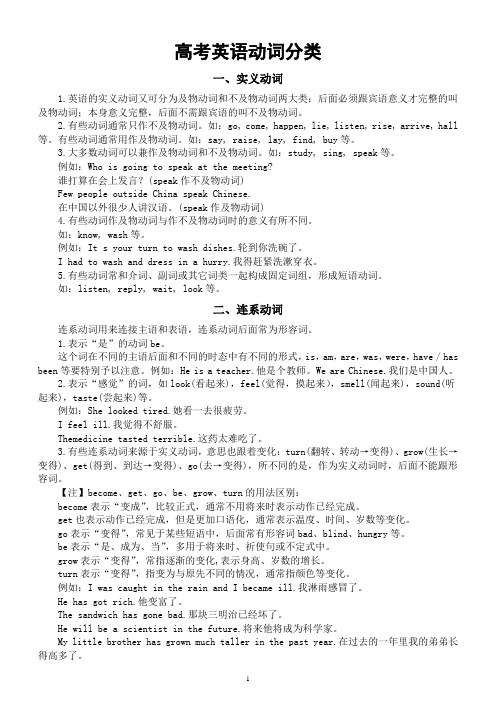
高考英语动词分类一、实义动词1.英语的实义动词又可分为及物动词和不及物动词两大类:后面必须跟宾语意义才完整的叫及物动词;本身意义完整,后面不需跟宾语的叫不及物动词。
2.有些动词通常只作不及物动词。
如:go, come, happen, lie, listen, rise, arrive, hall 等。
有些动词通常用作及物动词。
如:say, raise, lay, find, buy等。
3.大多数动词可以兼作及物动词和不及物动词。
如:study, sing, speak等。
例如:Who is going to speak at the meeting?谁打算在会上发言?(speak作不及物动词)Few people outside China speak Chinese.在中国以外很少人讲汉语。
(speak作及物动词)4.有些动词作及物动词与作不及物动词时的意义有所不同。
如:know, wash等。
例如:It s your turn to wash dishes.轮到你洗碗了。
I had to wash and dress in a hurry.我得赶紧洗漱穿衣。
5.有些动词常和介词、副词或其它词类一起构成固定词组,形成短语动词。
如:listen, reply, wait, look等。
二、连系动词连系动词用来连接主语和表语,连系动词后面常为形容词。
1.表示“是”的动词be。
这个词在不同的主语后面和不同的时态中有不同的形式,is,am,are,was,were,have / has been等要特别予以注意。
例如:He is a teacher.他是个教师。
We are Chinese.我们是中国人。
2.表示“感觉”的词,如look(看起来),feel(觉得,摸起来),smell(闻起来),sound(听起来),taste(尝起来)等。
例如:She looked tired.她看一去很疲劳。
I feel ill.我觉得不舒服。
英语高考高效备考之动词分类整理及分析

谓语说明主语的情况,即主语的动作或状态; 动词是表示动作或状态的词,具有时态、语态、语 气和人称、数的变化。 实义动词:及物动词、不及物动词 连系动词 助动词 情态动词
Verbs动词
Verbs动词 1. 实义动词(notional verb):能独立做谓语的动词. 及物动词vt.:本身意思不完整, 需要接宾语才能使其意 思完整. 不及物动词vi.:自身意思完整,无需接宾语 我们学习英语。 We study English. 太阳从东方升起。 The sun rises in the east. 2. 连系动词(linking verb):连系主语和表语,说明 主语的状态、性质特征或身份等。
2. become, turn, get, go, fall能用名词作表语 His dream has become (got) a reality. He has turned scientist. He has gone socialist. He fell (a) victim to cancer. (他患了癌症。) 注意:go , turn 后面的名词通常不带冠词。 3. come , grow , get + to do 表示变化过程, • I've really come to love this place. 表示"最终变得" Mary's growing to be more and more like her mother. 表示"渐渐变得" You'll soon get to like it. 表示"由不……变得" • 注意:不能用于带有一段时间的完成时态 (误)They have got to know each other for years. (正)They have known each other for years.
高考英语单词分类总结

listen to sb
sound like sth
hear sb
arrive in/at
get to
reach
belong to sb
own sth
possess sth
lie in +
be situated in +
be located in +
contact with sb
助动词
1
be
形式变化:am/ is/ are/ was/ were/ been/ being
同时是实义和系动词
2
do
形式变化:does/ did
同时是实义动词
3
have
形式变化:has/ had/ having
同时是实义动词
4
shall
形式变化:should
同时是情态动词
5
will
形式变化:would
fail + in
succeed +in doing
fall +off/ onto
struggle + for/ against
vote +for/ against
care + for/about
apologize + to sb for doing
argue + about sth with sb
作及物动词时是"升高;举起"。He lifted his glass and drank.
类似的还有:beat vi.(心脏)跳动/vt.敲、打; grow vi.生长/ vt.种植
play vi.玩耍/ vt.打(牌、球)演奏smell vi.发出(气味)/ vt.嗅
高中英语高考复习动词分类讲解(共10类)
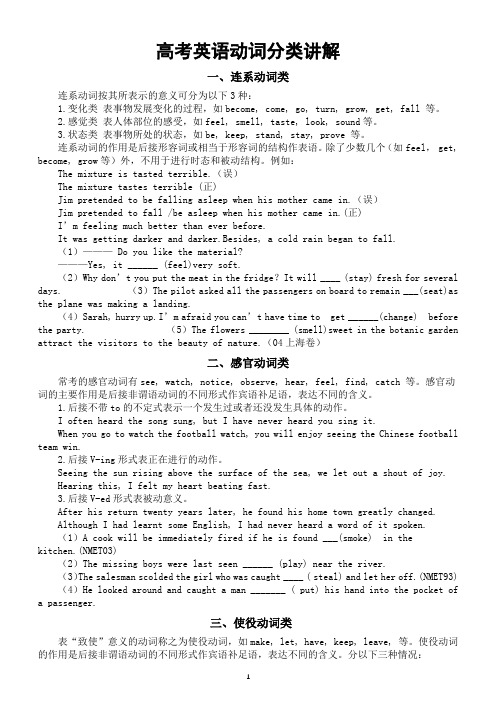
高考英语动词分类讲解一、连系动词类连系动词按其所表示的意义可分为以下3种:1.变化类表事物发展变化的过程,如become, come, go, turn, grow, get, fall 等。
2.感觉类表人体部位的感受,如feel, smell, taste, look, sound等。
3.状态类表事物所处的状态,如be, keep, stand, stay, prove 等。
连系动词的作用是后接形容词或相当于形容词的结构作表语。
除了少数几个(如feel, get, become, grow等)外,不用于进行时态和被动结构。
例如:The mixture is tasted terrible.(误)The mixture tastes terrible (正)Jim pretended to be falling asleep when his mother came in.(误)Jim pretended to fall /be asleep when his mother came in.(正)I’m feeling much better than ever before.It was getting darker and darker.Besides, a cold rain began to fall.(1)——— Do you like the material?———Yes, it ______ (feel)very soft.(2)Why don’t you put the meat in the fridge?It will ____ (stay) fresh for several days. (3)The pilot asked all the passengers on board to remain ___(seat)as the plane was making a landing.(4)Sarah, hurry up.I’m afraid you can’t have time to get ______(change) before the party. (5)The flowers ________ (smell)sweet in the botanic garden attract the visitors to the beauty of nature.(04上海卷)二、感官动词类常考的感官动词有see, watch, notice, observe, hear, feel, find, catch 等。
高考动词考点必会20类
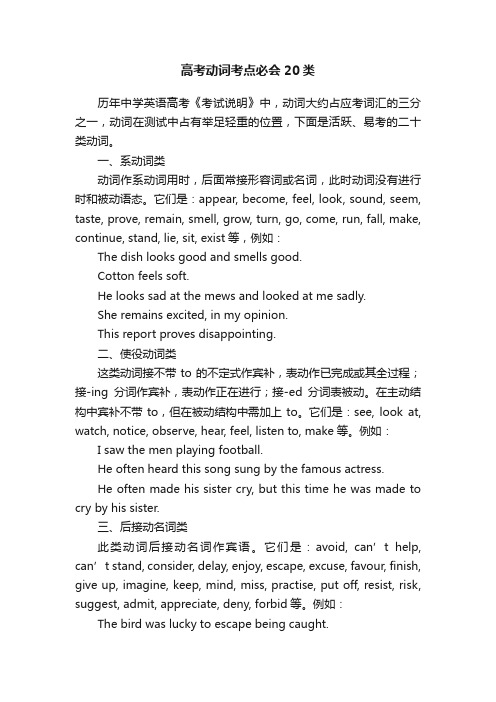
高考动词考点必会20类历年中学英语高考《考试说明》中,动词大约占应考词汇的三分之一,动词在测试中占有举足轻重的位置,下面是活跃、易考的二十类动词。
一、系动词类动词作系动词用时,后面常接形容词或名词,此时动词没有进行时和被动语态。
它们是:appear, become, feel, look, sound, seem, taste, prove, remain, smell, grow, turn, go, come, run, fall, make, continue, stand, lie, sit, exist等,例如:The dish looks good and smells good.Cotton feels soft.He looks sad at the mews and looked at me sadly.She remains excited, in my opinion.This report proves disappointing.二、使役动词类这类动词接不带to的不定式作宾补,表动作已完成或其全过程;接-ing分词作宾补,表动作正在进行;接-ed分词表被动。
在主动结构中宾补不带to,但在被动结构中需加上to。
它们是:see, look at, watch, notice, observe, hear, feel, listen to, make等。
例如:I saw the men playing football.He often heard this song sung by the famous actress.He often made his sister cry, but this time he was made to cry by his sister.三、后接动名词类此类动词后接动名词作宾语。
它们是:avoid, can’t help, can’t stand, consider, delay, enjoy, escape, excuse, favour, finish, give up, imagine, keep, mind, miss, practise, put off, resist, risk, suggest, admit, appreciate, deny, forbid等。
高考英语动词总结
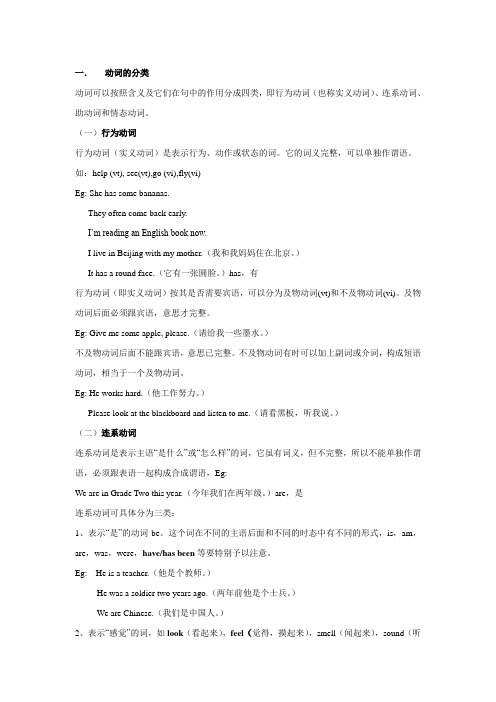
一.动词的分类动词可以按照含义及它们在句中的作用分成四类,即行为动词(也称实义动词)、连系动词、助动词和情态动词。
(一)行为动词行为动词(实义动词)是表示行为、动作或状态的词。
它的词义完整,可以单独作谓语。
如:help (vt), see(vt),go (vi),fly(vi)Eg: She has some bananas.They often come back early.I’m reading an English book now.I live in Beijing with my mother.(我和我妈妈住在北京。
)It has a round face.(它有一张圆脸。
)has,有行为动词(即实义动词)按其是否需要宾语,可以分为及物动词(vt)和不及物动词(vi)。
及物动词后面必须跟宾语,意思才完整。
Eg: Give me some apple, please.(请给我一些墨水。
)不及物动词后面不能跟宾语,意思已完整。
不及物动词有时可以加上副词或介词,构成短语动词,相当于一个及物动词。
Eg: He works hard.(他工作努力。
)Please look at the blackboard and listen to me.(请看黑板,听我说。
)(二)连系动词连系动词是表示主语―是什么‖或―怎么样‖的词,它虽有词义,但不完整,所以不能单独作谓语,必须跟表语一起构成合成谓语,Eg:We are in Grade Two this year.(今年我们在两年级。
)are,是连系动词可具体分为三类:1、表示―是‖的动词be。
这个词在不同的主语后面和不同的时态中有不同的形式,is,am,are,was,were,have/has been等要特别予以注意。
Eg: He is a teacher.(他是个教师。
)He was a soldier two years ago.(两年前他是个士兵。
高考英语常考的9大类动词

高考英语常考的9大类动词英语高考的时候,不管是单词、短语、句型还是语法,都会被考察到,所以考生们一定要全面复习好这些知识。
下面是小编整理的高考英语常考的9大类动词,欢迎大家阅读分享借鉴,希望对大家有所帮助。
高考英语常考的9大类动词一. 表示“使/让……”概念的动词这类动词常见的有:have, let, make, get, keep, drive, send, leave, force, cause等.它们后边分别可跟不定式,分词,形容词、介词短语,名词等作宾语补足语。
例如:I felt sorry to have kept you waiting for me so long.对不起,让你久等了。
The victory sent our spirits rising.胜利使得我们情绪高涨。
二. 不定式做宾补,不定式符号可以省略的动词常见的有;see, watch, hear, observe, feel, notice, listen to, llook at等感官动词及表示使役概念的have,let,mak等。
这类词在变为被动语态时,其后不定式符号 to常补出。
例如:We are made to work far into the night.我们被迫干活到深夜。
注:在这种结构中,watch,have,let一般不变为被动语态。
如:The boy was watched to come out。
(误)三. 不定式作宾语补足语,其后内容省略而只保留不定式符号的动词此类动词常见的有:refuse,want,intend,oblige,mean,expect,tell,hope,like,love,plan,try, prefer,wish等。
例如:-----Why did you cause the baby cry?-----I did n't mean to.四. 引导宾语从句用虚拟预期的动词这类动词在引导宾语从句时常用:should+动词原形,should可以省略,常见的有:order,demend,suggest,insist,require,advise,decide,propose等。
高考要背的动词
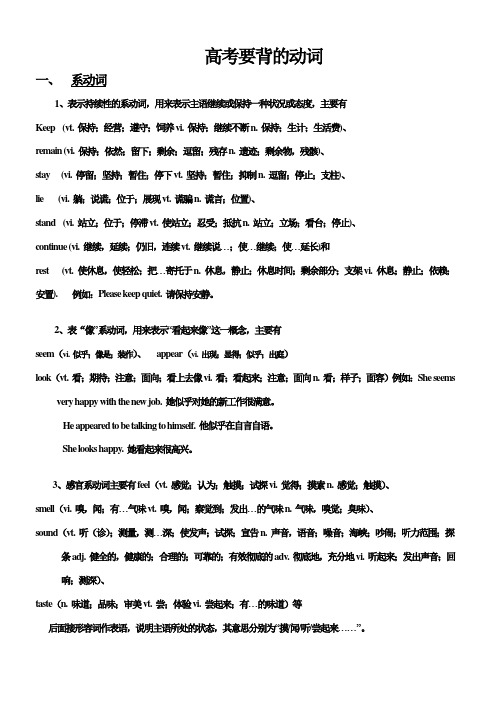
高考要背的动词一、系动词1、表示持续性的系动词,用来表示主语继续或保持一种状况或态度,主要有Keep (vt. 保持;经营;遵守;饲养vi. 保持;继续不断n. 保持;生计;生活费)、r em ain (vi. 保持;依然;留下;剩余;逗留;残存n. 遗迹;剩余物,残骸)、stay (vi. 停留;坚持;暂住;停下vt. 坚持;暂住;抑制n. 逗留;停止;支柱)、lie (vi. 躺;说谎;位于;展现vt. 谎骗n. 谎言;位置)、stand (vi. 站立;位于;停滞vt. 使站立;忍受;抵抗n. 站立;立场;看台;停止)、continue (vi. 继续,延续;仍旧,连续vt. 继续说…;使…继续;使…延长)和r est (vt. 使休息,使轻松;把…寄托于n. 休息,静止;休息时间;剩余部分;支架vi. 休息;静止;依赖;安置). 例如:Plea se keep quiet. 请保持安静。
2、表“像”系动词,用来表示“看起来像”这一概念,主要有seem(vi. 似乎;像是;装作)、 appear(vi. 出现;显得;似乎;出庭)look(vt. 看;期待;注意;面向;看上去像vi. 看;看起来;注意;面向n. 看;样子;面容)例如:She seem s ver y happy with the new j ob. 她似乎对她的新工作很满意。
He appear ed to be talking to him self. 他似乎在自言自语。
She looks happy. 她看起来很高兴。
3、感官系动词主要有f eel(vt. 感觉;认为;触摸;试探vi. 觉得;摸索n. 感觉;触摸)、sm ell(vi. 嗅,闻;有…气味vt. 嗅,闻;察觉到;发出…的气味n. 气味,嗅觉;臭味)、sound(vt. 听(诊);测量,测…深;使发声;试探;宣告n. 声音,语音;噪音;海峡;吵闹;听力范围;探条adj. 健全的,健康的;合理的;可靠的;有效彻底的adv. 彻底地,充分地vi. 听起来;发出声音;回响;测深)、taste(n. 味道;品味;审美vt. 尝;体验vi. 尝起来;有…的味道)等后面接形容词作表语,说明主语所处的状态,其意思分别为“摸/闻/听/尝起来……”。
高三英语动词归类复习学生课堂笔记.doc

高三英语动词归类复习学生课堂笔记一、连系动词类①变化类: become get turn grow make come go fall②感官类: look sound feel taste smell③显得类: seem appear look④状态类: keep stay remain lie sit stand (prove turn out)二、使役、感官动词类: see look at watch notice observe let make have/get hear listen to feel提示:吾看三室两厅一感觉三、主动表被动: sell wash burn cook cut drive dress play last open write start run read act draw提示:说明主语的特点、性质、状态四、只接动名词做宾语的词/词组: consider suggest/advise look forward to excuse/pardon admit put off/delay/postpone fancy avoid miss keep/keep on practice deny finish enjoy/appreciate forbid imagine risk can’t help mind allow/permit escape提示:考虑建议盼原谅,承认推迟没得想。
避免错过继续练,否认完成就欣赏。
禁止想象才冒险,不禁介意准逃亡。
①“to”作介词get down to devote… to lead to be/get/become used togo back to object to②带有介词in succeed(in) spend/waste time(in) be busy(in)have a good/hard time(in) have difficulty/trouble(in)③give up dislike feel like insist on can’t stand understand④“值得”be worth=deserve be worthy of being done / be worthy to be done⑤It is no use/good It is of little use/good It is useless五、只接不定式作宾语的词/词组:decide/determine learn want expect/hope/wish refuse manage care pretend offer promise choose plan agree ask/beg help提示:决心学会想希望,拒绝设法愿假装。
高考英语复习:动词归类.ppt
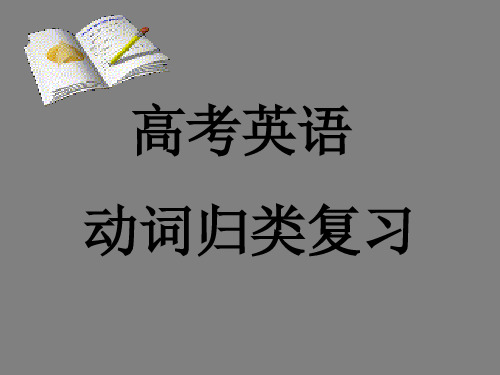
1. see , look at , watch , notice , observe have \ get ; hear , listen to ; feel + 宾语 + V-ing \ V-ed, ※make 不带V-ing 作宾语补足语 ; ※let sb do sth.
2. 此外: find, leave, keep +宾语 + V-ing \V-ed; catch + 宾语 + V-ing
died last night.
3.The flowers ___ sweet in the botanic
garden attract the visitors to the beauty of
nature.
A. to smell
B. smelling
C. smelt
D. to be smelt
4. _T_a_st_in_g__(taste) so delicious, the food in this
market was sold out soon.
Conclusion: 1. 连系动词后面跟形容词作表语。 2. 连系动词无被动语态。
③“显得”类:seem, appear, look
It looks as if… It seems as if / that… It appears that…
A. turned out
B. seemed
C. looked
D. became
注be, become, turn, remain, make可带名词
He remains a teacher.=He is still a teacher.
高中英语动词种类和形式知识点归纳
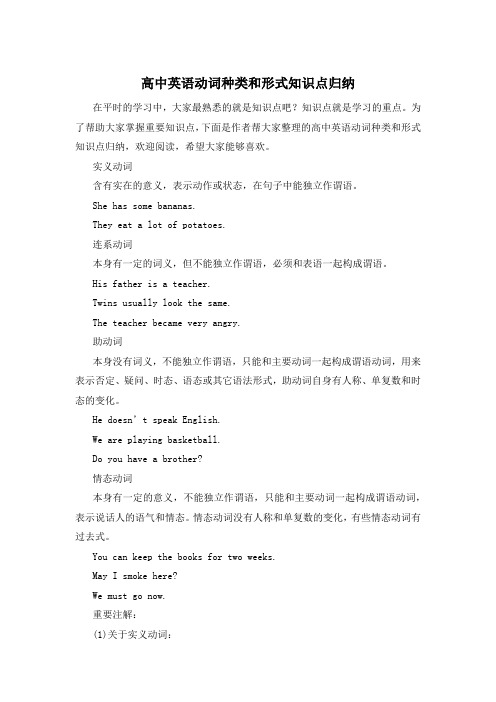
高中英语动词种类和形式知识点归纳在平时的学习中,大家最熟悉的就是知识点吧?知识点就是学习的重点。
为了帮助大家掌握重要知识点,下面是作者帮大家整理的高中英语动词种类和形式知识点归纳,欢迎阅读,希望大家能够喜欢。
实义动词含有实在的意义,表示动作或状态,在句子中能独立作谓语。
She has some bananas.They eat a lot of potatoes.连系动词本身有一定的词义,但不能独立作谓语,必须和表语一起构成谓语。
His father is a teacher.Twins usually look the same.The teacher became very angry.助动词本身没有词义,不能独立作谓语,只能和主要动词一起构成谓语动词,用来表示否定、疑问、时态、语态或其它语法形式,助动词自身有人称、单复数和时态的变化。
He doesn’t speak English.We are playing basketball.Do you have a brother?情态动词本身有一定的意义,不能独立作谓语,只能和主要动词一起构成谓语动词,表示说话人的语气和情态。
情态动词没有人称和单复数的变化,有些情态动词有过去式。
You can keep the books for two weeks.May I smoke here?We must go now.重要注解:(1)关于实义动词:①英语的实义动词又可分为及物动词和不及物动词两大类:后面必须跟宾语意义才完整的叫及物动词;本身意义完整,后面不需跟宾语的叫不及物动词。
②有些动词通常只作不及物动词。
如:go,e,happen,lie,listen,rise,arrive等。
有些动词通常用作及物动词。
如:say,raise,lay,find,buy等。
③大多数动词可以兼作及物动词和不及物动词。
如:study,sing等。
④有些动词作及物动词与作不及物动词时的意义有所不同。
高考英语热点动词分类整理

高考英语热点动词分类整理一、连系动词类连系动词按其所表示的意义可分为以下3种:1.变化类表事物发展变化的过程,如become, go, turn, grow, get, fall等。
2.感觉类表人体部位的感受,如feel, smell, taste, look, sound appear, seem, look 等。
3.状态类表事物所处的状态,如keep, come, run, remain, stand, lie, stay, prove 等。
连系动词的作用是后接形容词或相当于形容词的结构作表语。
除了少数几个(如feel, get, become, grow等)外,不用于进行时态和被动结构。
例如:The mixture is tasted terrible.(误) The mixture tastes terrible(正)【高考例题】(1) ---Do you like the material? ---Yes, it ____ very soft. (NMET94)(西安分卷3)A. is feelingB. feltC. feelsD. is felt(2) Why don't you put the meat in the fridge? It will ____ fresh for several days. (NMET 03)A. be stayedB. stayC. be stayingD. have stayed(3) The pilot asked all the passengers on board to remain ____ as the plane was making a landing. (04春季高考上海卷) A. seat B. seating C. seated D. to be seating(4) Be careful when you cross this very busy street. If not, you may ____ run over bya car. (02高考北京卷) A. have B. get C. become D. turn(5) Happy birthday, Alice. So you have ____ twenty-one already. (04天津卷)A. becomeB. turnedC. grownD. passed(6) Sarah, hurry up. I'm afraid you can't have time to ____ before the party. (04全国卷II)A. get changedB. get changeC. get changingD. get to change(7) 0n hearing the news of the accident in the coal mine, she ____ pale. (04湖北卷)A. gotB. changedC. wentD. appeared(8 )The flowers ____ sweet in the botanic garden attract the visitors to the beauty of nature. (04上海卷) A. to smell B. smelling C. smelt D. to be smelt(9) Although he has taken a lot of medicine, his health ____ poor. (02春上海卷)A. provesB. remainsC. maintainsD. continues(10) I love to go to the seaside in summer. It ____ good to lie in the sun or swim in the cool sea. A. does B. feels C. gets D. makes二、感官动词类常考的感官动词有see, watch, notice, observe, hear, feel, find, catch等。
- 1、下载文档前请自行甄别文档内容的完整性,平台不提供额外的编辑、内容补充、找答案等附加服务。
- 2、"仅部分预览"的文档,不可在线预览部分如存在完整性等问题,可反馈申请退款(可完整预览的文档不适用该条件!)。
- 3、如文档侵犯您的权益,请联系客服反馈,我们会尽快为您处理(人工客服工作时间:9:00-18:30)。
高考英语动词分类一、实义动词1.英语的实义动词又可分为及物动词和不及物动词两大类:后面必须跟宾语意义才完整的叫及物动词;本身意义完整,后面不需跟宾语的叫不及物动词。
2.有些动词通常只作不及物动词。
如: go,come,happen,lie,listen, rise,arrive,hall 等。
有些动词通常用作及物动词。
如:say,raise,lay,find,buy 等。
3.大多数动词可以兼作及物动词和不及物动词。
如:study,sing,speak 等。
例如: Who is going to speak at the meeting?谁打算在会上发言? (speak 作不及物动词)Few people outside China speak Chinese.在中国以外很少人讲汉语。
(speak 作及物动词)4.有些动词作及物动词与作不及物动词时的意义有所不同。
如:know,wash 等。
例如:It s your turn to wash dishes.轮到你洗碗了。
I had to wash and dress in a hurry.我得赶紧洗漱穿衣。
5.有些动词常和介词、副词或其它词类一起构成固定词组,形成短语动词。
如:listen,reply,wait,look 等。
二、连系动词连系动词用来连接主语和表语,连系动词后面常为形容词。
1.表示“是”的动词be。
这个词在不同的主语后面和不同的时态中有不同的形式, is,am,are,was,were,have /has been等要特别予以注意。
例如: He is a teacher.他是个教师。
We are Chinese.我们是中国人。
2.表示“感觉”的词,如look(看起来), feel(觉得,摸起来),smel1 (闻起来), sound (听起来), taste(尝起来)等。
例如: She looked tired.她看一去很疲劳。
I feel ill.我觉得不舒服。
Themedicine tasted terrible.这药太难吃了。
3.有些连系动词来源于实义动词,意思也跟着变化: turn (翻转、转动→变得)、grow (生长→变得)、get (得到、到达→变得)、go (去→变得),所不同的是,作为实义动词时,后面不能跟形容词。
【注】become、get、go、be、grow、turn 的用法区别:become表示“变成”,比较正式,通常不用将来时表示动作已经完成。
get 也表示动作已经完成,但是更加口语化,通常表示温度、时间、岁数等变化。
go 表示“变得”,常见于某些短语中,后面常有形容词bad、blind、hungry 等。
be表示“是、成为、当”,多用于将来时、祈使句或不定式中。
grow表示“变得”,常指逐渐的变化,表示身高、岁数的增长。
turn 表示“变得”,指变为与原先不同的情况,通常指颜色等变化。
例如: I was caught in the rain and I became ill.我淋雨感冒了。
He has got rich.他变富了。
The sandwich has gone bad.那块三明治已经坏了。
He will be a scientist in the future.将来他将成为科学家。
My little brother has grown much taller in the past year.在过去的一年里我的弟弟长得高多了。
Her face turned red after her mother criticized her.妈妈批评了他以后他的脸变红了。
三、助动词1.常见的助动词有:用于进行时和被动语态的be (am,is,are,was,were,been,being)、用于完成时的have(has,had,having)、用于将来时的shall(should)、will(would) 和用于一般时的do(does,did)。
2.助动词必须同主语的人称和数一致,就是说因主语人称、数的不同而采用不同的形式,其中有些助动词也可作情态动词。
如:shall,will,should,would。
四、情态动词1.常见的情态动词can (could),may(might),must,shall (should),will(would),dare(dared),need 等,另外, have to、had better也当作情态动词使用。
情态动词后面必须加动词的原形。
2.can表示体力、脑力方面的能力或客观的可能性。
口语中,在询问或说明一件事可不可以做时,常用“can”代替“may”。
情态动词“can”的过去式是“could”,否定式“cannot”通常缩写成“can’t”,“could”的否定式是“could not”,通常缩写成“couldn’t”。
例如:Can Ihelp you?要帮忙吗? He can swim.他会游泳。
That can’t be Mr Li.那不可能是李先生。
3.may表示允许、请求或可能性,用may提问时,肯定回答一般用Certainly或Yes,you may.;否定回答一般用can’t或mustn’t。
例如:—May I ask you a question?—Certainly.——可以问你一个问题吗?——当然可以。
You may go now.现在你可以走了。
It may be in your pocket.它可能在你的衣袋里。
4.must表示“必须”、“一定”的意思。
表示“必须”时否定形式是mustn’t;表示“一定”时,否定形式是“can’t”。
例如:We must be very careful when we cross the road.我们过马路时一定要非常小心。
It must be Jack.那准是杰克。
I haven’t seen Kate today.She can’t be here.我今天没有看到过凯特,她不可能在这里。
【注】用must(必须)进行提问时,肯定回答用must, 否定回答用needn’t;用must(一定) 进行提问时,肯定回答仍用must, 但是否定回答用can’t。
例如:—Must we clean the room before we leave?—Yes,you must./ No,you needn’t.我们走之前必须要打扫房间吗? 是的,必须打扫。
/不,不需要。
—Must she be in the room?—Yes,she must./ No,she can’t.——她一定在房间里吗?——是的,一定。
/不,不可能在。
5.“have to”表示“不得不”、“必须”。
have to的疑问形式是:助动词+…+have to,否定形式是:助动词+not+have to或者用needn’t。
例如:Do you have to stay until 8 o’clock?你得呆到8点钟吗?You don't have to do so. (=You needn’t do so.)你不用这么做。
6.shall在问句中,可表示征求对方意见,与第一人称连用;在陈述句的第二、三人称的主语后或表示“命令”、“警告”、“允许”等。
例如:Shall we go to the zoo this weekend?我们这个周末去动物园好吗?He shall bring his own book next time.他下次必须带自己的书来。
7.should可表示“劝告”、“建议”、“惊奇”等意思。
例如:We should speak to old people politely.我们应该礼貌地对老人讲话。
8.will表示“意愿”、“决心”等意思,一般与第二人称连用。
例如:Will you please close the door for me?请你替我把门关上好吗?I will teach you a lesson.我要教训你一顿。
9.would表示过去的“意愿”、“决心”等。
例如:He would sit near the fire every time he returned home.每次他回到家中总要坐在火炉边。
【注】would 也可以表示现在的情况,表达说话人向对方提出的要求,语气比“will”婉转、客气。
在日常会话中,“我想要…”通常用“I would like to”来表示。
例如:Would you like to have a rest at the moment?你现在想要休息一下吗?would还可以表示过去经常发生的事情。
例如:Every year parents would tell their children about the boy who would save his people.每一年父母们总是向孩子们讲述这个将会拯救他的人民的男孩的事。
10.need表示“需要”,用于疑问句或否定句。
“need”作实义动词时,在肯定、否定、疑问句中都可以用。
例如:He needn’t do it in such a hurry.他不需要如此匆忙地做这件事。
He needs some help.他需要一些帮助。
He doesn't need to bring his football socks then.那么他就无须带上足球袜了。
11.dare是“敢”的意思,用法几乎与“need”完全相同,即在疑问句和否定句中,可以作情态动词,后面用不带“to”的动词不定式。
在肯定句中和实义动词一样,后面的动词不定式要带“to”。
例如:How dare you say I am a fool?你竟敢说我是个傻瓜?He didn’t dare to touch the red button.他不敢触碰那个红色的按钮。
12.had better do意为“最好做”,通常缩写为“’d better not”一般也当作情态动词使用,否定式是'd better not do。
例如:You'd better sit here and say nothing.你最好坐在这儿不讲话。
You'd better not speak because he is sleeping.你最好不要讲话因为他正在睡觉。
